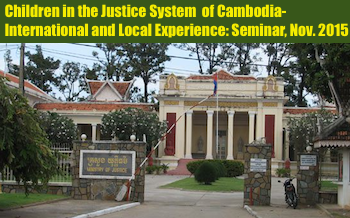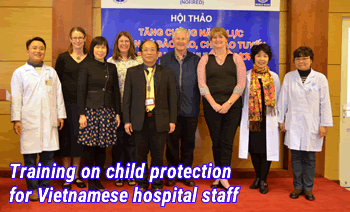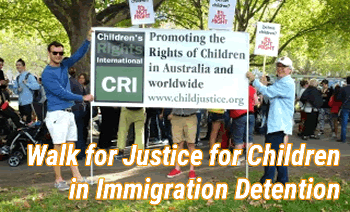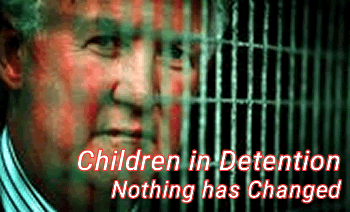Conferences
In March 2005 in Cape Town, South Africa approximately 700 judges, lawyers and other professionals committed to children’s rights gathered at the 4th World Congress on Family Law and Children's Rights.
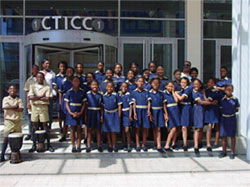 The venue was the Cape Town International Convention Centre. This was the fourth such meeting following the inaugural Congress in Sydney, Australia in 1993; the second in San Francsico, USA in 1997; and the third in Bath, England in 2001. It marked the 15th anniversary of the most widely ratified human rights convention of all time, the United Nations Convention of the Rights of the Child (UNCROC).
The venue was the Cape Town International Convention Centre. This was the fourth such meeting following the inaugural Congress in Sydney, Australia in 1993; the second in San Francsico, USA in 1997; and the third in Bath, England in 2001. It marked the 15th anniversary of the most widely ratified human rights convention of all time, the United Nations Convention of the Rights of the Child (UNCROC).
Malik, a severely malnourished one-year-old boy, is comforted by his mother, Hawa, in a UNICEF-supported therapeutic feeding centre at the El Fasher Teaching Hospital in El Fasher, capital of North Darfur. Several other women are visible behind them. Courtesy UNICEF.
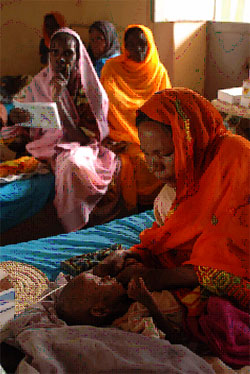
Although real progress has been made since the Convention was adopted, children are still dying in appalling numbers from preventable diseases such as malaria. Some 300,000 are child soldiers, or otherwise victims of the ultimate obscenity, war. Over 1 million are exploited every year in the multi-billion dollar sex industry.
Children are bought and sold by organised crime rings and moved around the world as slaves. More than 14 million are now orphaned by HIV/AIDS; many of these will act as family heads and carry the disease themselves. 65% of the 121 million children in the world who are not in school are girls. Many more million children live in poverty and hunger.
It was these issues and many others that brought together international delegates from throughout the world and in particular from the African continent to review the success or otherwise of UNCROC in its 15 years of operation.
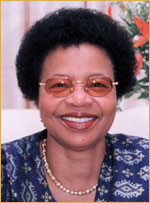 Madam Graca Machel Patron of the 4th World Congress opened the event with a stirring personal call, which had the audience on their feet.
Madam Graca Machel Patron of the 4th World Congress opened the event with a stirring personal call, which had the audience on their feet.
Her message was simple. Don’t hesitate to do what you can as an individual to protect the rights of children no matter how small that act might seem. Do it now was her strong message. This theme concentrated the minds of the delegates in an area where the vastness of the task can often seem almost overwhelming.
Madam Machel had been preceded by the African Children’s Choir who set an optimistic tone for the event with their stirring singing and dancing. The choir had just returned from George in South Africa where they had performed at the 46664 Concert in front of Nelson Mandela and his wife Graca Machel.
At the George Concert Nelson Mandela said:
"We are all affected by the Aids pandemic. But more than others this epidemic carries the face of women. For it is women who bear the most significant burden of HIV and Aids.….
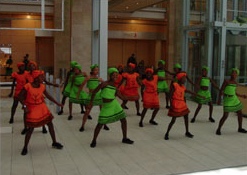 "For every woman and girl violently attacked, we reduce our humanity. For every woman forced into unprotected sex because men demand this, we destroy dignity and pride. Every woman who has to sell her life for sex we condemn to a lifetime in prison. For every moment we remain silent, we conspire against our women. For every woman infected by HIV, we destroy a generation….
"For every woman and girl violently attacked, we reduce our humanity. For every woman forced into unprotected sex because men demand this, we destroy dignity and pride. Every woman who has to sell her life for sex we condemn to a lifetime in prison. For every moment we remain silent, we conspire against our women. For every woman infected by HIV, we destroy a generation….
"We must be honest and open about the power relationships between men and women in our society, and we must help build a more enabling and supportive environment that puts the role of women center stage in this struggle…
"Each one of us - sister and brother, mother and father, teacher and student, priest and parishioner, manager and worker, Presidents and Prime Ministers, must add a voice to this call for action…
"Not tomorrow, or the next week - but now…
"You can help break the silence. Talk about HIV and Aids. You can urge your leaders to do more and act now. You can show more care and compassion. You can protect our women and the next generation."
Resolutions
COMMUNIQUE FROM THE 4TH WORLD CONGRESS ON FAMILY LAW & CHILDREN’S RIGHTS
We, representatives of 60 nations gathered for the 4th World Congress on Family Law and Children’s Rights at Cape Town, South Africa from 20 – 23 March 2005.
FOCUSING
On the progress of the implementation of the Convention of the Rights of the Child after 15 years.
BELIEVING
That the health and education of the children of the world is the greatest guarantee available for the peace and prosperity of the world to come.
And believing that armed conflict is an almost insuperable obstacle to the health and education of children within the area.
Believing that the continued existence of child pornography, especially on the internet, trafficking in women and children, child soldiers, and children unable to receive an education by reason of having to work, and the plight of child refugees is a shame to the world and deserving of the strongest condemnation.
And, as to delegates from the United States of America believing that all nations should accede to the UN Convention on the Rights of the Child and noting that to date only the USA and Somalia have failed to accede to the Convention and that representatives of the Somalian Government have indicated an intention to accede to the Convention in the near future. Noting that the Supreme Court of the United States of America in the recent case of Roper declared unconstitutional the death penalty for children in the United States of America.
CALL UPON the lawmakers of the USA to accede to the Convention as soon as possible.
The rights of indigenous children warrant robust protection in all dimensions of their lives.
That religious freedom is an important part of a child’s rights.
AND NOTING
That many States have made substantial progress in adopting and putting into effect the Convention on the Rights of the Child, but there are still some nations which by reason of poverty, internal strife, or other reasons still have a long way to go in implementing the Convention.
And that significant progress has been made in many countries by direct judicial action in implementing the Convention.
And that direct contact between judges and courts of different nations has been an effective mechanism in some cases for implementing some clauses of the Convention.
And noting the scurge of HIV / AIDS which in South Africa alone appears to affect 5.6 million people.
And that the extensive work is being undertaken globally for women in understanding, educating and challenging their attitudes and actions in matters such as health, sexual behaviours, parenting, status rights and in relationships.
That in some jurisdictions commissioners for children’s rights and children’s ombudsman have been able to play a notable part in the protection of children.
That Children’s Rights International has provided beneficial advocacy and representation in many jurisdictions for the protection of children.
THE CONGRESS HAS RESOLVED:
IMPLEMENTATION OF THE CRC
Resolution 1
That State Parties take their commitment to post-ratification more seriously to incorporate the Convention on the Rights of the Child into its domestic law and particularly that pursuant to Article 43 of the CRC State Parties make the principles and provisions of the CRC widely known to adults and children alike by ongoing programmes.
Resolution 2
This Congress calls upon all governments to give full legislative effect to the Convention on Children’s Rights in order to give full effect to and enforce the constitutional and international obligations towards vulnerable children.
Resolution 3
That bar societies and organisations representing advocates, develop ethical rules / standards of practice and advocacy in Family Law that are consistent with Article 3 and 12 of the UN Convention on the Rights of the Child; and that these rules / standards establish clear expectations for interdisciplinary continuing education.
Resolution 4
That the UN adopts accessible and meaningful international standards for the protection of children without parental care.
Resolution 5
That governments who have ratified the convention on the rights of the child should be encouraged to allocate sufficient resources to enable courts to implement to the fullest extent the conventions principles.
Resolution 6
States and international agencies when formulating and implementing measures and structures to prevent and (when it occurs) ameliorate the consequences of forced marriage. Must have the protection and rehabilitation of the victim as the primary focus and purpose of such measures and Must not, to the detriment of the interests of the victim, be governed by issues of state / public policy or immigration / migration concerns.
Resolution 7
That the CRC in its entirety, including especially the right of participation, the right to continuity of care, and the right to cultural and ethnic identity, shall be protected in child welfare proceedings involving indigenous children.
Resolution 8
There is a need for interdisciplinary collaboration and dialogue in defining a child’s best interests and such collaboration should be encouraged.
Resolution 9
That where possible courts and the legal system should provide for the financial security of children as an aid to their development health and education.
HIV / AIDS
Resolution 10
The Congress calls upon the all governments where HIV/AIDS is a significant problem to recognise and urgently address the issue of child sexual abuse in the context of HIV/AIDS through strengthening abuse prevention mechanisms ensuring timely access to post-exposure prophylaxis and counselling for child rape survivors and strengthening the justice system to:
Put in place a comprehensive package of services and support for children and their caregivers including but not limited to food security and the provision of financial support
Ensure access to effective and accessible ARV treatment for all HIV positive children and adults who need it
Improve access to sufficient resources for NGO’s and community-based organisations involved in the care and support of HIV infected families and communities
Provide local support which is appropriate to the needs of vulnerable children, in line with national priorities, sustained and properly coordinated.
NGOs
Resolution 11
The Congress urges all governments to give full support to NGOs in delivery of social services.
CHILDREN’S VILLAGES
Resolution 12
Under Review
THE CHILD’S VOICE
Resolution 13 & 14 inclusive
Children have a voice. What they say is important.
Governments should encourage the promotion and development of the participation of the child in the process since his rights are being examined and decided – making sure his voice is heard.
Resolution 15
The Congress calls upon States to include in their national legislation / plans of action:
education strategies
training of lawyers , judges, social workers and other stake holders affecting children
and other supportive measures to give children a voice in proceedings that affect them
Resolution 16
States should develop child inclusive processes which promote self esteem in children without burdening them with a sense of the responsibility of decision-making.
DOMESTIC ABUSE
Resolution 17
That family courts should present a consistent message of its condemnation of domestic abuse (DA); and for DA to be reduced and so the home to become a safer place for children and all family members; and for society’s unacceptability and intolerance of DA to reach those who seek assistance from the family court on financial matters; and for the family court to hand down fair, just and socially acceptable outcome.
Resolution 18
This Congress calls on all jurisdictions to make Domestic Abuse a factor and consideration in quantum on financial matters on relationship breakdown, wherever possible, and / or provide methods for the family justice system to compensate for the affect of DA on victims from the abusive family member, and for a report on progress at the next Congress.
<h3">Resolution 19
All States should make adequate financial, social and emotional provision to enable and support victims who wish / need to live away from their family and for community so to do.
RE-INTEGRATION
Resolution 20
That Children’s Rights International commit to look for development of community care systems for successful reintegration and repatriation of vulnerable children who are bonded slaves or are in slavery-like practices in all countries.
TRANSSEXUALISM
Resolution 21a
That legal and medical institutions throughout the world be called upon to recognise children with transsexualism as experiencing an intersexual condition derived by way of a natural biological variation in human sexual formation rather than a mental disorder.
Resolution 21b
That legal and medical institutions throughout the world be called upon to recognise the legitimacy of the sexual identity affirmed by a child (male or female) and the rights of that child to have a consistent legal identity (in the absence of that affirmation being derived from a diagnosed delusional disorder) rather than have that sexual identity imposed and not withstanding that such affirmed sexual identity is different from that indicated by one or more of the sexual characteristics of the children.
CHILD MIGRANTS
Resolution 22
The UN is requested to adopt and proclaim an International Child Migrants Day on the UN Calendar.
ABDUCTION OF CHILDREN
Resolution 23
"There is a need to explore the potential benefits of the Hague Children's Conventions for a much wider range of States - including in particular the States in sub-Saharan Africa. With appropriate measures of implementation, (which respect culture which take account of issues of capacity, and in particular the problem of access to legal services and procedures), the Hague Children's Conventions offer a structure for improving inter-State co-operation in the region to protect children at risk in cross-frontier contexts, and they provide access to a rapidly developing global network of judges and other professionals who are devoted to the common protection of children."
RELOCATION
Resolution 24
Create a framework to make uniform standards to determine a child’s best interests (as opposed to forum selection) in international relocation cases.
ALTERNATIVE DISPUTE RESOLUTION
Resolution 25
Make mediation and ADR the primary forum for dispute resolution concerning children and families.
ADOPTION
While noting the tension between CRC and some aspects of international adoption, international adoption has a place, even as last resort and providing it is properly regulated for the protection of orphaned and refugee children.
FUTURE PLANS
That the next World Congress have a program that examines legal education programs (Law Schools) that focus upon Articles 3 and 12 of the UN Convention on the Rights of Children, and interdisciplinary studies related to children in family law.
That the next World Congress have a program that considers:
- Judicial roles
- Changes in judicial roles
- Judicial education and their relation to and promotion of Articles 3 and 12 of the UN Convention
This Congress calls for commitment globally to understand, educate and challenge attitudes and actions of men to sexual behaviour and relationships and children, and for reports on this work and progress made to be presented at the next Congress.
- Details
- Hits: 10167
The International Conference evaluated the progress and achievements made in relation to the eradication of the worst forms of child labour and will explore the challenges ahead in securing rights for children in the 21st century and meeting the UN Millennium Goals by 2015.
The Conference reflected on whether the International Labour Organisation (ILO) and the International Programme on the Elimination of Child Labour (IPEC), as defined by the ILO in Forms of Child Labour Convention No.182 (C182) and its associated Recommendation (R190), address the right issues, in the light of 21st century concerns with nationalism, identity and globalisation, or whether new approaches to protecting children’s rights are needed. The Conference focussed on the role of the organizations representing employers and workers, non-government organisations as well as governments. The Conference engaged the corporate sector with a view to bringing a concrete reality to the much vaunted concept of responsible corporate citizenship. It highlighted steps taken by some companies and organisations operating internationally to address the worst forms of exploitation in their labour obligations and their attempts to try to set higher standards.
- Details
- Hits: 9294
RESOLUTIONS
Resolution 1
Member states should be encouraged to examine whether they might decriminalise parental abduction so as to remove any impediment to the prompt return of the child.
Resolution 2
There are provisions in the Brussels II (bis) that are capable of ensuring the return of an abducted child in circumstances where the Hague Convention would not result in such an order. The Hague Conference should be asked to examine whether the provisions of the relevant European regulations could and should be imported into the Hague Abduction Convention or the protocol to same.
Resolution 3
This Congress recognises that it is in the best interests of the child, subject of international abduction, to have return proceedings, and where possible, any further proceedings upon their return, dealt with expeditiously, within 6 weeks of the launch of proceedings, wherever possible. To facilitate such expedition:
a) the Congress calls upon courts to set and adhere to procedural timetables and protocols that ensure the speedy determination of applications, and
b) the Congress supports the concept of judicial communication between network judges.
Resolution 4
Recognizing that the 1996 Hague Convention on the Protection of Children provides an important global system for improving the protection of children in international situations, the Congress urges states that have not already done so to give urgent consideration to ratifying or acceding to the instrument and to put in place an accompanying training programmes for judges, advocates and other relevant professions.
Resolution 5
The recruitment of children as combatants deserves the strongest international condemnation. Further, sanctions should be provided for those who recruit children as combatants and those who knowingly supply weapons to states or individuals who use child combatants.
Resolution 6
The World Congress:
a) encourages the adoption of the ethical practices and principles of the Royal Children’s Hospital, Melbourne, those principles being:
I. minimise physical risk to child;
II. minimise psycho-social risk to child;
III. preserve potential for fertility;
IV. preserve or increase capacity to have satisfying sexual relations;
V. leave options open for the future; and
VI. consider the wishes and beliefs of the parents.
b) notes the debate as to whether issues of disorders of sexual development should be left to the time when the child attains Gillick competence, even in terms of therapeutic intervention.
Resolution 7
The Congress notes the request to the Board to continue the relationship between pediatricians and the Congress.
Resolution 8
That a committee be formed for the purpose of advising and reporting to Children’s Rights International.
Resolution 9
The Congress supports exploring the recognition of a child’s right in relation to medical treatment.
Resolution 10
The World Congress supports all states and nations making appropriate provision for the legal representation of children in family law disputes and child protection cases. Having regard to the damage that high conflict cases can cause children, an interdisciplinary approach to the representation of children is likely to be beneficial to them.
Resolution 11
The World Congress urges Countries to collaborate through the internet with KINSA (Kids Internet Safety Alliance) to deal with the issue of missing children and on-line sex offenders.
Resolution 12
The Congress urges all nations to develop laws and policies directed at outlawing all forms of trafficking including sexual and labour exploitation.
Resolution 13
The Congress urges all countries who are either the source or recipients of trafficked children and youth, both male and female, to enact model reciprocal laws in accordance with the UNTOC and the Trafficking Protocol to deal with the issue of child trafficking including:
a) the protection and rehabilitation of victims of child trafficking;
b) appropriate support services to victims such as shelters, child protection workers and medical services;
c) the treatment of such victims as victims of crime rather than illegal immigrants or prostitutes including provisions enabling them to establish themselves in the countries to which they have been trafficked;
d) provisions for obtaining the evidence of victims of trafficking where possible using modern technology such as video conferencing to enable evidence to be given outside the countries where their prosecutions take place; and
e) provisions specifically outlawing the holding of children and youth captive for the purpose of sexual labour and other exploitation.
Resolution 14
The Congress supports the following:
a) Legislation dealing with the abuse of children should contain definitions of abuse that capture the diverse risks to children arising in cyber space.
b) until an international legal instrument dealing with cyber abuse comes into effect, national legislatures should take all necessary protective actions to prevent such abuse and should cooperate with other countries to eliminate cyber abuse.
c) Governments should be informed by international technical expert opinion in drafting measures to prevent cyber abuse.
d) Legislatures should ensure that education is provided to parents and children that will enable children to develop discriminatory skills in relation to the use of the internet in a way less likely to harm them.
Resolution 15
The Congress sees a need for community, legal and judicial education on the topic of brain development of infants and children to better inform decision making.
Resolution 16
The Congress recognizes the importance of donor conceived persons having access, at the age of majority, to identifying information about all parties involved with their conception.
Resolution 17
The Congress calls upon all nations to undertake initiatives to promote positive parenting skills and move toward the elimination of corporal punishment of children by parents and institutions by legislation.
Resolution 18
The Congress calls upon those nations not currently using restorative justice programmes to use such programmes so that child offenders are reintegrated into the community and to provide gender specific programmes where appropriate.
Resolution 19
The Congress supports:
a) Children and adolescents with gender identity development dysphoria having a right to be protected from unnecessary suffering, stigma and bullying.
b) Children and their family being able to participate fully in decision making processes about treatment options; and
c) Children and their families should have the right to have access to services that would assist their gender identity development.
Resolution 20
The Congress supports the following proposals:
a) When a judge is hearing a case concerning a child, the judge give consideration to hearing from the child directly.
b) Whether the judge hears from the child shall depend on the child’s age and maturity, whether the child wishes to see the judge, and all other relevant circumstances including whether other material is available.
c) Judicial training in the area of child witnesses.
Resolution 21
The World Congress call upon the United Nations and the Hague Conference on Private International Law to propose a convention on surrogacy for the protection of children born as a result of such arrangements.
Resolution 22
The World Congress encourages appropriate authorities to undertake longitudinal research into:
a) the effects of shared parenting arrangements on children, and
b) the effects of relocation on children.
Resolution 23
The Congress commends the governments of the Kingdom of Cambodia for developing a new juvenile justice law and:
a) Urges its enactment as soon as possible. .
b) Requests that it be in accordance with the requirements of the UNCRC.
c) Urges it to end the practices of holding children and youth in adult jails.
d) Suggests that it develop programmes for the rehabilitation of young offenders as a matter of urgency.
e) Urges it to further develop child protection and legal aid services.
f) Requests it to further enhance the training of judges, prosecutors, police and lawyers in juvenile justice principles.
Resolution 24
The Congress encourages developed countries to:
a) Build the capacity of law enforcement officers and the legal profession by providing appropriate financial and technical support to Cambodia and other developing countries in the juvenile justice area.
b) Cooperate in establishing a monitoring system in respect of Cambodia and other developing countries to ensure that juvenile justice objectives are met in accordance with UNCRC objectives.
Resolution 25
The Congress urges the Governments of Australia, Canada and their respective States, Provinces and Territories and all other Nations whose indigenous people practice customary or traditional adoption to introduce legislation:
a) that gives legal recognition to the practice of customary or traditional adoption in so far as it is not inconsistent with human rights norms; and
b) where customary or traditional adoption has the intended effect of the relevant children being brought up as children of the adoptive parents the law should provide that those children have the legal status and rights of children of the adoptive parents.
Resolution 26
The World Congress supports the following:
a) Legal professional bodies should devise and provide guidance to their members as to the role of the lawyer when representing children as well as standards to assess the competence of children to give instructions.
b) Institutions should provide legal training to students to educate members and students in representing children.
Resolution 27
The Congress supports:
a) In children’s cases it is appropriate to take into consideration the best interests of the child.
b) That in cases of conflict between religion and culture in children’s cases consideration should be given to the views of the child taking into account competency and information available to that child.
Resolution 28
Noting that there can be a tension between state welfare agencies and minority cultural groups the Congress urges:
a) The establishment of formal and extensive communication between state agencies, professionals, cultural and religious groups.
b) Better education of agencies and professionals in the culture and religion of minority groups.
c) Education for children in the minority groups to assist in the understanding of the role of child protection.
d) Encourage participation of children and young people from minority groups in decision making processes.
e) Using existing and proposed legislation to better support the victims of abuse in the minority group.
Resolution 29
The World Congress urges all nations and states to make available relevant resources for sharing information, such as that contained in the Canadian domestic violence benchbook. The Board is asked to explore the possibility of this information being made available on its website.
Resolution 30
World Congress supports the right of parents with a disability to have competent legal representation in public and private law proceedings concerning their children and recommends that court architecture accommodate the needs of that parent.
Resolution 31
The World Congress urges governments to increase support services to parents with disabilities to assist in keeping families intact.
Resolution 32
Member countries are to be encouraged to implement UNCROC as domestic law to assist enforcement issues of children’s rights.
Resolution 33
The Congress recognises that a child’s right to a relationship with his or her parents is subordinate to the child’s right to be protected from serious harm.
Resolution 34
The World Congress joins the UN in demanding the elimination of female genital mutilation, which is contrary to the United Nations Convention on the Rights of the Child.
Resolution 35
The World Congress supports the World Health Assembly Resolution and also urges all Nations:
a) to accelerate actions towards the elimination of female genital mutilation, including
education and information necessary for full understanding of the gender, health and human rights dimensions of female genital mutilation;
b) to enact and enforce legislation to protect girls and women from all forms of violence, particularly female genital mutilation, and ensure implementation of laws prohibiting female genital mutilation by any person, including medical professionals;
c) to support and enhance community-based efforts to eliminate the practice of female genital mutilation, particularly ensuring men’s and local leaders’ participation in the process to eliminate the practice;
d) to work with all sectors of government, international agencies and nongovernmental organizations in support of the abandonment of the practice as a major contribution to attainment of the Millennium Development Goals on promoting gender equality and empowerment of women, reducing child mortality, and improving maternal health;
e) to formulate and promote guidelines for the care, particularly during childbirth, of girls and women who have undergone female genital mutilation; and
f) to develop or reinforce social and psychological support services and care and to take measures to improve health, including sexual and reproductive health, in order to assist women and girls who are subjected to this violence.
Resolution 36
WHEREAS the United States has as its history the establishment and development of human rights doctrine, beginning with the Bill of Rights to the United States Constitution; and
WHEREAS the United States also has a long history of establishing in its law the legal rights and special protection of children; and
WHEREAS the United States was an active participant in drafting the United Nations Convention on the Rights of the Child, contributing proposals for 38 of the 40 substantive articles contained in the Convention, and particularly proposals advancing the civil and political rights of children and their parents; and
WHEREAS the United States plays a vital role in leading the world to establish and ensure human rights and particularly the rights of children;
THEREFORE BE IT RESOLVED that the Congress calls on the United States to exercise its leadership role in this regard by ratifying the United Nations Convention on the Rights of the Child, lending its considerable and valuable expertise to the world in improving the status of children and young people.
Resolution 37
The World Congress endorses the principal that governments should invest in families by supporting parents at all stages of family development as well as at family dissolution.
- Details
- Hits: 8787













